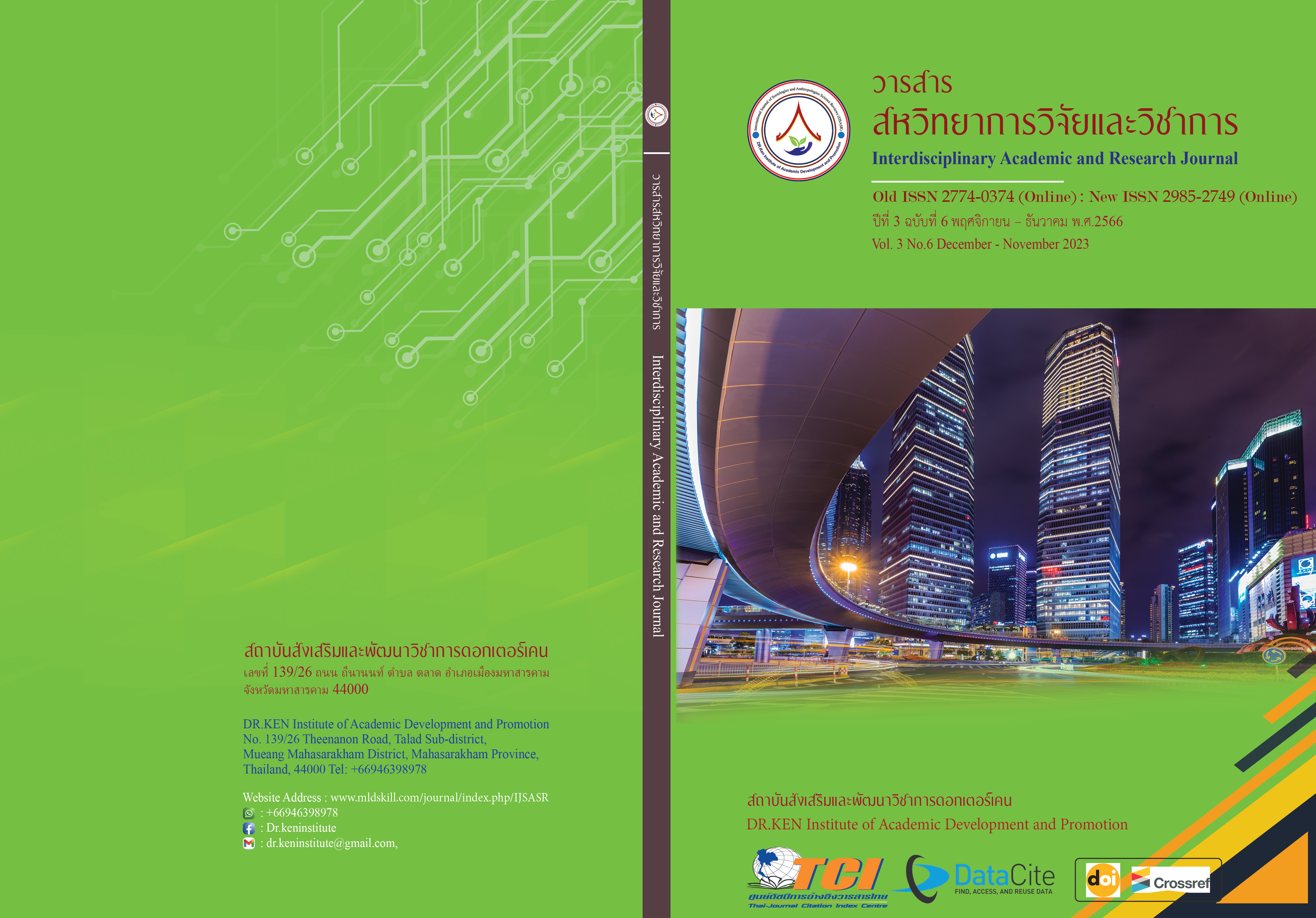The Development of a Training Curriculum for Active Learning Management in the 21st Century for Teachers in Phrapariyattidhamma Schools in the Department of General Education
DOI:
https://doi.org/10.60027/iarj.2023.270647Keywords:
Training Course; , Active Learning Management in the 21st CenturyAbstract
Background and Aim: Learning management in the 21st century is a learning management for learners to gain new skills in line with social conditions, with an emphasis on information and communication skills, as well as work skills. Proactive learning management is therefore a learning management approach that aims to enable learners to develop advanced ideas. The purposes of this research were 1) to study the basics, problem conditions, and needs of the training, 2) to develop the curriculum, 3) to implement the curriculum, and 4) to study the effectiveness of the training curriculum.
Methodology: The research was divided into 4 phases. Phase 1 is to study basic training data, problem conditions, and the needs of the training. Phase 2 is to develop the curriculum. Phase 3 is to implement the curriculum. The last phase is to evaluate it. The sample group in Phase 1 is 108 monks. Additionally, the informants in the focus group were 16 experts which were obtained by purposive sampling. The target group in Phase 2 is 7 expert informants who are used in the seminar based on connoisseurship. The sample group in Phase 3 is 30 monks as participants in the training course. Phase 4 Assessment of the curriculum includes 30 participants. The tools for data collection are questionnaires, interview forms, conformity assessment forms, and appropriateness tests. Statistics for data analysis are percentage, mean, and standard deviation.
Results: The research found that (1) The basics, problem conditions, and demands for the training, show administrators and teachers agreed that they would like to develop teachers on active learning management. Since the students have gone through the thinking process from their practice, it leads to the creation of a durable body of knowledge. The level of teachers' opinions on the problem conditions and needs in the proactive learning management training in the 21st century was moderate. As for the level of training needs, it was found that the overall level was high. (2) The development of the training course consists of 7 parts: 1) Problems and conditions 2) Principle of the Curriculum 3) Objectives of the curriculum 4) Content 5) Training activities 6) Media and learning resources 7) Evaluation and assessment. The result of the curriculum’s quality assessment by 7 experts, shows that the curriculum is commodified at the highest level. (3 The result of implementing the training course, 1) the formative test and post-exam scores indicate that process and outcome efficiency of the trainees is higher than 80 percent, statistically significant at the .01 level. 2) the satisfaction of the monks who participated in this training is also at the highest level. And (4) The result of the training course evaluation by 30 participants, overall, all aspects were at the highest level.
Conclusion: The research on developing training courses for proactive learning management in the 21st century at the Prajumtara School, Ordinary Education Department, found that administrators and teachers believe that teachers need development in proactive learning management. Providing students with hands-on opportunities and engaging in reflective thinking enhances knowledge resilience. Overall, the challenges of proactive learning management are moderate, while the training needs are high. The developed training course consists of 7 components, aligning well with the identified needs, and the experimental use demonstrates over 80% effectiveness in both process and outcomes, with high satisfaction among participants and monks across all aspects of the course.
References
พิมพ์พันธ์ เดชะคุปต์. (2558). การเรียนการสอนที่เน้นผู้เรียนเป็นสำคัญ: แนวคิด วิธีและเทคนิคการสอน1. กรุงเทพฯ : เดอะมาสเตอร์กรุ๊ป.
วรพจน์ วงศ์กิจรุ่งเรือง และอธิป จิตตฤกษ์. (2556). ทักษะแห่งอนาคตใหม่ การศึกษาเพื่อศตวรรษที่ 21 (พิมพ์ครั้งที่ 2). กรุงเทพฯ: โอเพ่นเวิลต์ส พับลิชชิ่ง เฮาส์.
วรางคณา ทองนพคุณ. (2556). ทักษะแห่งศตวรรษที่ 21 ความท้าทายในอนาคต = 21st Century Skills: The Challenges Ahead. ค้นเมื่อ 10 มีนาคม 2565, จาก http://www.education.pkur.ac.th
วิจารณ์ พานิช. (2556). ครูเพื่อศิษย์สร้างห้องเรียนกลับทาง. พิมพ์ครั้งที่ 2. กรุงเทพฯ: มูลนิธิสยามกัมมาจล.
วิชัย วงษ์ใหญ่ (2554). การพัฒนาหลักสูตรระดับอุดมศึกษา. พิมพ์ครั้งที่ 2 กรุงเทพมหานคร : บริษัท อาร์ แอนด์ ปริ้นท์ จำกัด
สมเกียรติ ตั้งกิจวานิชย์ และคณะ. (2556). ข้อเสนอเพื่อการปฏิรูปการศึกษาขั้นพื้นฐานเพื่อสร้างความ รับผิดชอบ (accountability). Retrieved on 10 March 2022, from: http://tdri.or.th/priority- research/educational-reform-accountability
สำนักงานคณะกรรมการการศึกษาขั้นพื้นฐาน. (2558). แนวทางในการจัดทักษะการเรียนรู้ในศตวรรษที่ 21. กรุงเทพฯ: ชุมนุมสหกรณ์การเกษตรแห่ง ประเทศไทย จำกัด.
สิทธิพล อาจอินทร์. (2563). การพัฒนาหลักสูตร=Curriculum Development. พิมพ์ครั้งที่ 5. ขอนแก่น: โรงพิมพ์มหาวิทยาลัยขอนแก่น.
สุวิมล ว่องวานิช, (2560). การพัฒนาชุดการเรียนรู้เพื่อส่งเสริมทักษะการวิจัยในชั้นเรียนของนิสิตครู. คณะครุศาสตร์ จุฬาลงกรณ์มหาวิทยาลัย.
หน่วยศึกษานิเทศก์ สำนักงานคณะกรรมการการศึกษาขั้นพื้นฐาน. (2562). แนวทางการนิเทศเพื่อพัฒนาและ ส่งเสริมการจัดการเรียนรู้เชิงรุก (Active Learning) ตามนโยบายลดเวลาเรียนเพิ่มเวลารู้. สำนักงานคณะกรรมการการศึกษาขั้นพื้นฐาน.
อัสรี สระอีดี (2561). การพัฒนาหลักสูตรฝึกอบรมเพื่อเสริมสร้างสมรรถนะของครูพลศึกษาในศตวรรษที่ 21 โดยประยุกต์ใช้การอำนวยความสะดวกในการเรียนรู้ร่วมกับการสอนแบบเสริมศักยภาพ. วิทยานิพนธ์ปริญญาครุศาสตรดุษฎีบัณฑิต สาขาวิชาสุขศึกษาและพลศึกษา จุฬาลงกรณ์มหาวิทยาลัย.
Krejcie, V.R., & W.D. Morgan. (1970). Determining sample size for research activities,” Educational and Psychological Measurement. 30(3), 608-609.
Oliva, P.F. (1992). Developing the Curriculum. (3rd ed). New York: Harper Collins.
Saylor, J.G., & Alexander, M. W. (1974). Planning Curriculum for School. 3rd edition. New York: Holt Rinehart and Winston.
Downloads
Published
How to Cite
Issue
Section
License
Copyright (c) 2023 Thongpean Jaikha, Nattachai Jantachum, Tipaporn Sujaree

This work is licensed under a Creative Commons Attribution-NonCommercial-NoDerivatives 4.0 International License.
Copyright on any article in the Interdisciplinary Academic and Research Journal is retained by the author(s) under the under the Creative Commons Attribution-NonCommercial-NoDerivatives 4.0 International License. Permission to use text, content, images, etc. of publication. Any user to read, download, copy, distribute, print, search, or link to the full texts of articles, crawl them for indexing, pass them as data to software, or use them for any other lawful purpose. But do not use it for commercial use or with the intent to benefit any business.
















.png)


